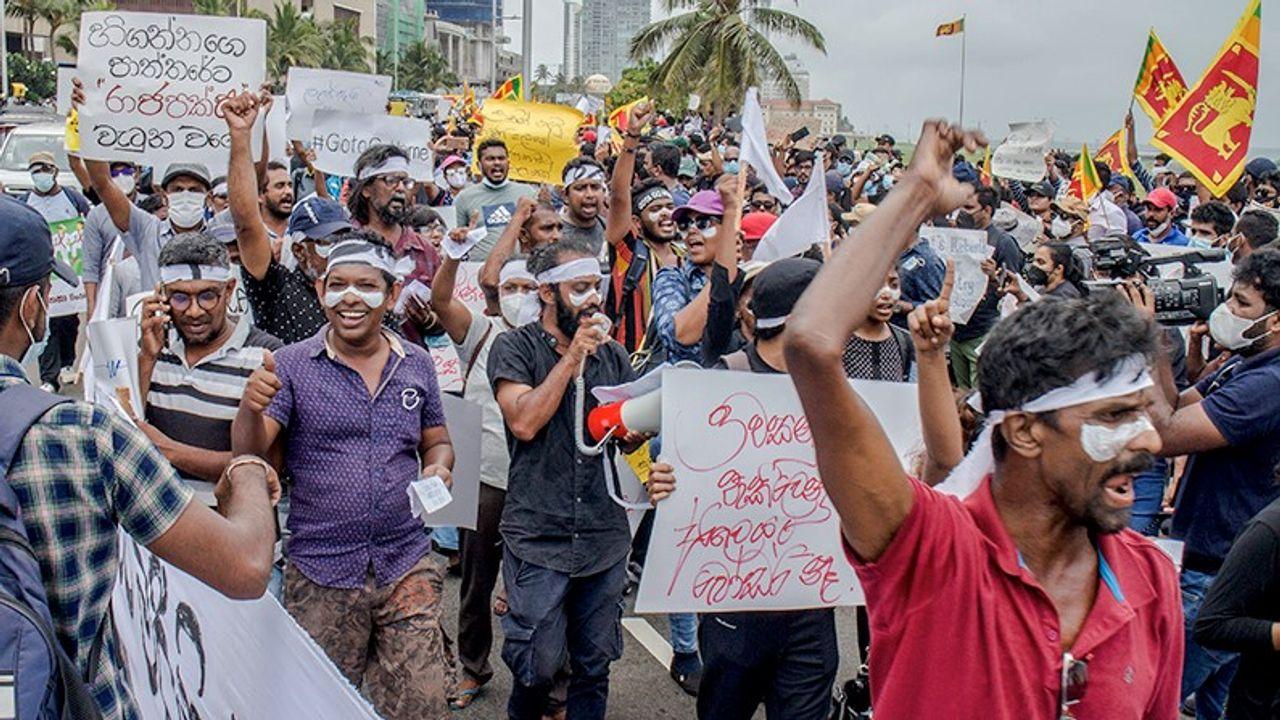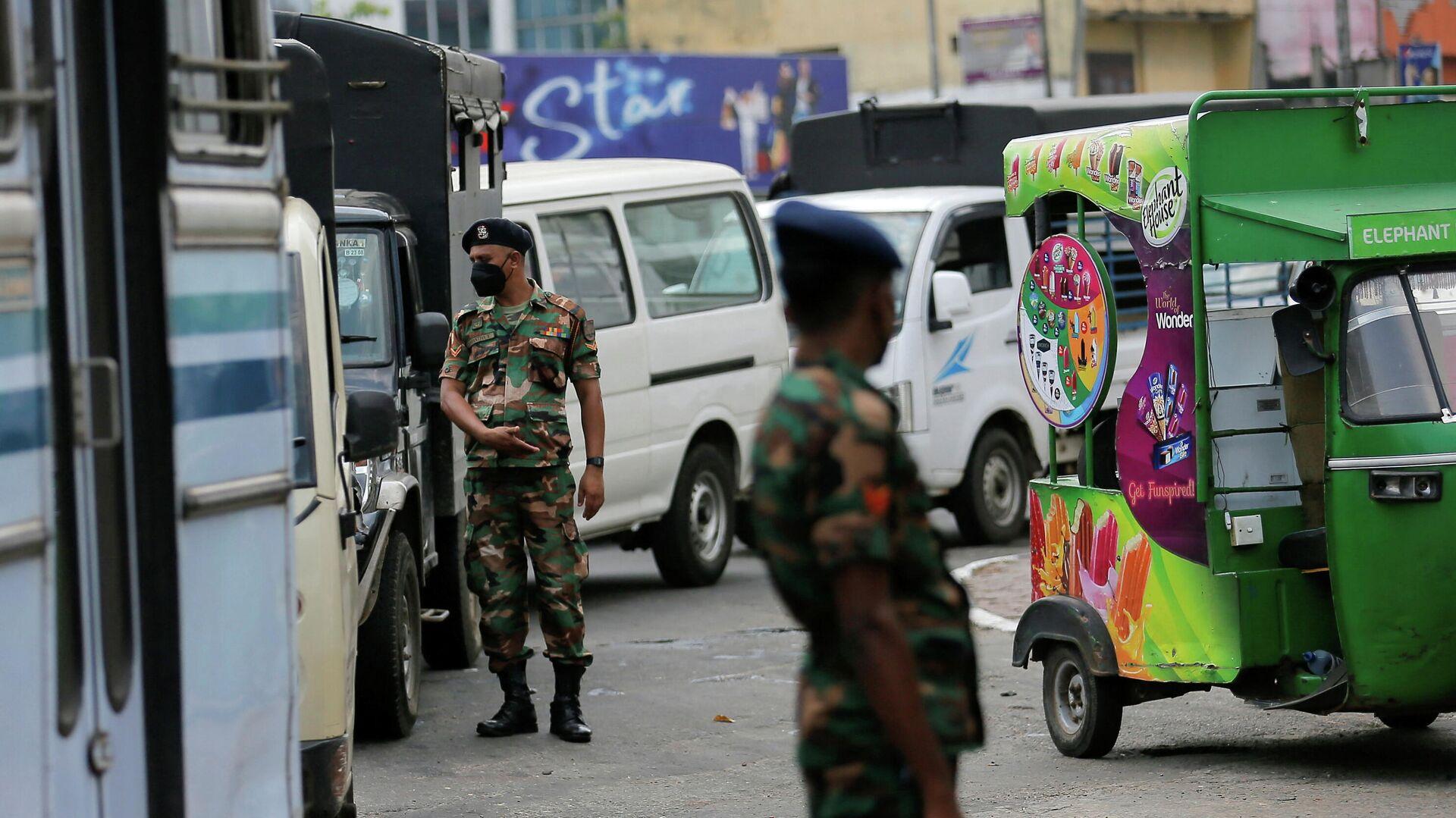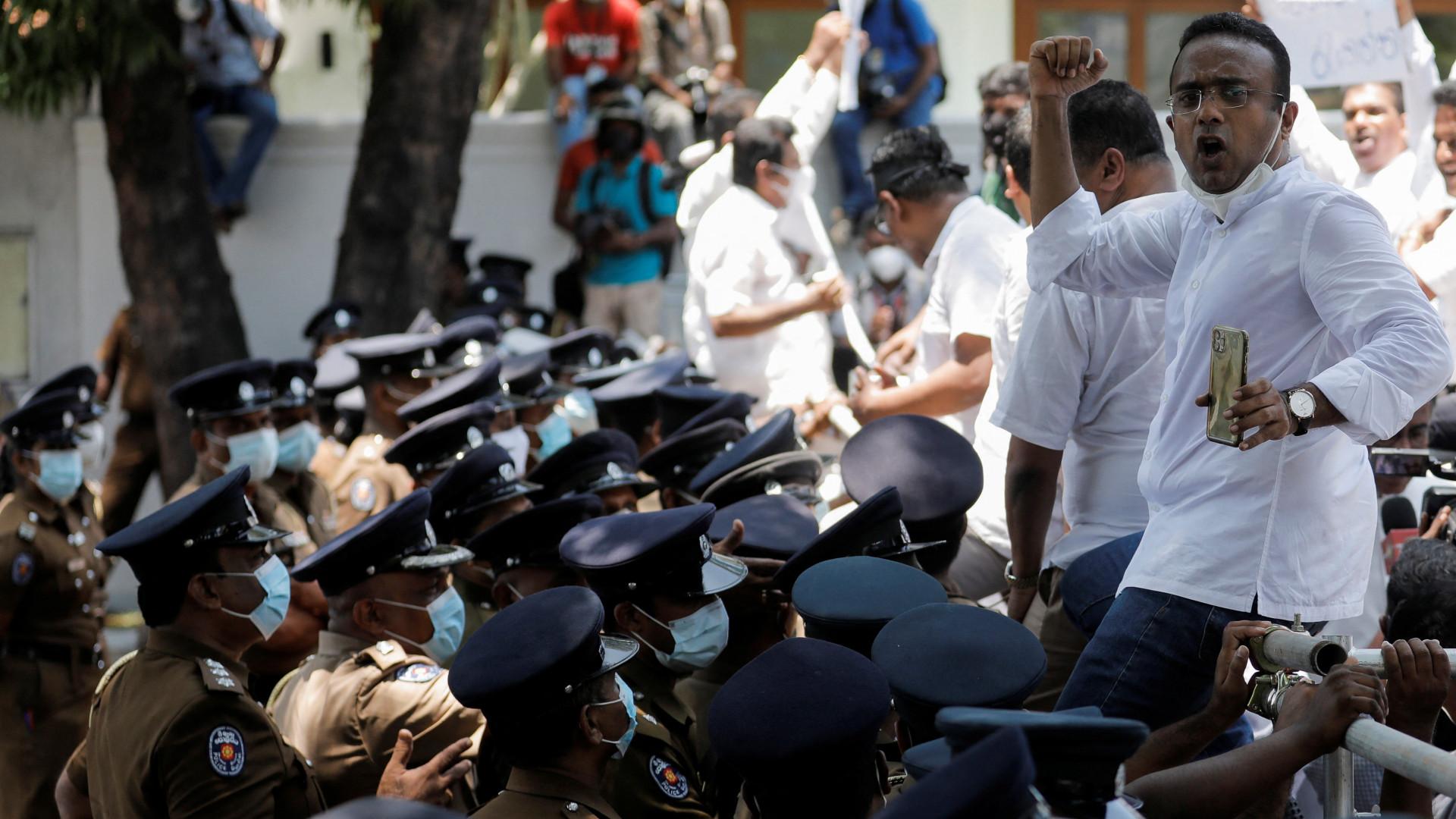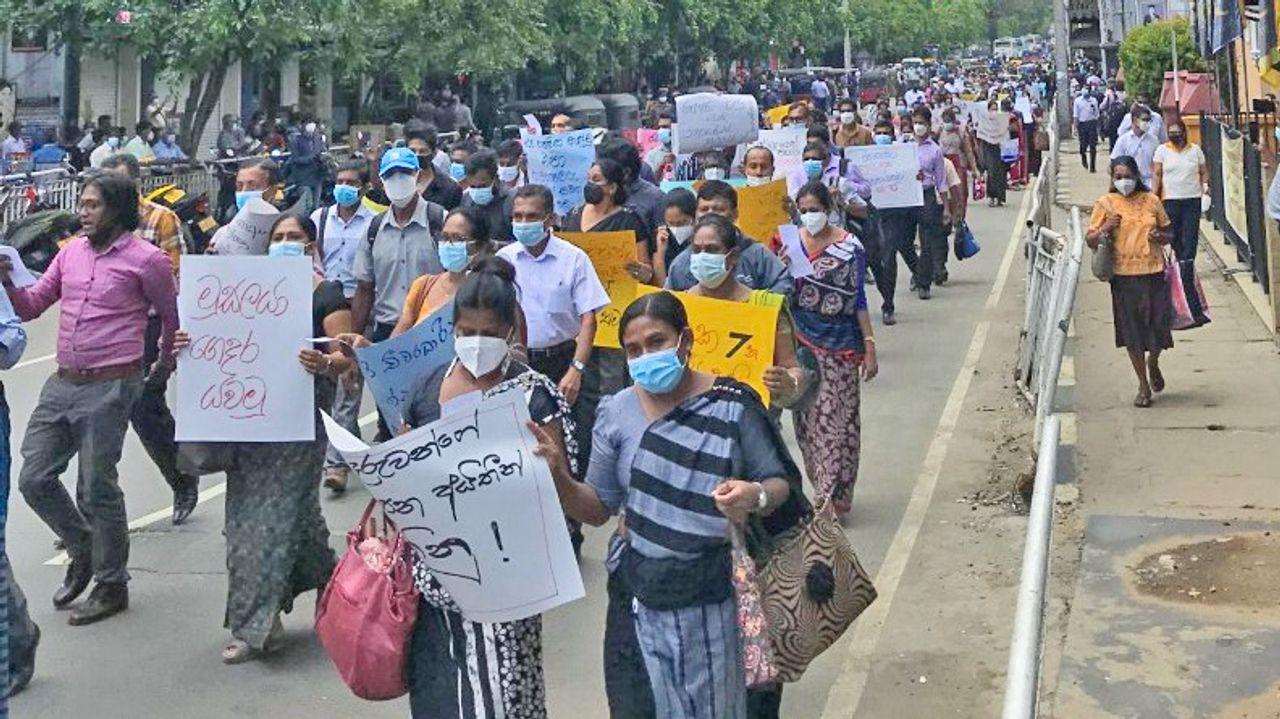Sri Lanka uprising: Light breeze at start of storm
Analysis by Maxim Petrov
ANALYTICS 13 July 2022 - 16:38
| Maxim Petrov Caliber.Az |
Food shortages, rising fuel prices and increased debts of states, due to which they are unable to import the necessary amount of food, create a revolutionary situation in poor countries. Due to the food and fuel crisis caused by the conflict in Ukraine, the world is on the verge of a new Arab Spring.
On July 9, footage appeared showing thousands of protesters in the capital of Sri Lanka - Colombo. They broke through the police barriers and seized the country president's residence. According to media reports, more than 30 people were injured. Then the protesters took a dip in the pool at the presidential residence. Presumably, the head of Sri Lanka Gotabaya Rajapaksa himself left the country. Reuters reported that the president, as well as the prime minister of the republic, Ranil Wickramasinghe, "were transported to a safe place".

The protests began in April and have reached unprecedented proportions in recent days. The media and international experts name various reasons for the uprising, in which, judging by the footage, tens of thousands of local residents took part. Among them is the pandemic, which has led to a sharp reduction in the influx of tourists - Sri Lanka is heavily dependent on the tourism industry.
The Economist reports that "last year, President Gotabaya Rajapaksa banned agrochemicals and told farmers to switch to organic products. Harvests have fallen. Six months later, he lifted the ban, but by that time, thanks to other stupid political decisions, there was too little hard currency to import enough chemical fertilizers. According to forecasts, the next harvest will be deplorable. Sri Lanka needs food and fuel, but cannot afford to import them".
Thus, a spontaneous social uprising took place in Sri Lanka. It is, of course, directed against the current politicians, but it's not so much about them as about the fact that people are dissatisfied with their economic situation and demonstrate their anger.
However, the economic situation is deteriorating not only in this country. Internal problems and local economic crises caused by local solutions interact everywhere with the new reality caused by the conflict in Ukraine. It has led to an increase in food and fuel prices around the world. Inflation, a sharp rise in the cost of the most necessary goods - the basic basket, hit the poor, and the working population the most. A wave of protests is rising or at least may rise in many countries - from Uganda to Iran, from Peru to Tunisia.

The publication Al-Monitor, specialising in news about the Middle East, cites the opinion of experts gathered at the event of the US Institute of Peace. In their opinion, most of the Middle East and North Africa suffer from food insecurity due to the conflict in Ukraine. Hanin Syed from the World Bank is a development specialist. She says that although only 6 per cent of the world's population lives in the Middle East, it accounts for 20 per cent of all people in the world suffering from food insecurity. She named Lebanon, Syria and Yemen as the countries experiencing the most acute food shortages. According to her, Lebanon, which has grain reserves for only one month, suffered the most, but Egypt, Tunisia, Morocco and Iraq also suffer from food insecurity.
World Food Programme economist Arif Husain explained exactly how the conflict in Ukraine affects food supplies to various countries. According to him, when wheat from Ukraine and Russia becomes unavailable, countries are forced to import it from other countries, which increases transportation costs. These costs are then passed on to consumers, i.e., the prices of products are rising. "There is food in the world, it's just not where you need it, and not at an affordable price," says Husain.
According to experts, the cost of imported food and fuel will increase, especially in poor countries. But the debts of poor countries have also increased. In such a situation, the most vulnerable countries are those with debts that import most of the food, fuel and fertilizers. Alas, many of the debts look unbearable. According to the IMF, 41 countries, where 7 per cent of the world's population lives, are in a state of "debt crisis" or are at high risk of its occurrence. For example, Laos is on the verge of default. Therefore, in the coming year in many countries, the number of events causing unrest, according to experts, will double. After all, poor countries suffering from growing debts and a shortage of foreign currency cannot afford the necessary food purchases abroad. Faced with the threat of starvation or, at least, malnutrition, the social lower classes are capable of rebellion - they have nothing more to lose.

If we summarise the opinions of various experts, we get the following picture.
Many governments are too indebted to mitigate the blows that the current crisis is inflicting on living standards. The growth of debts leads to the threat of default, the withdrawal of capital from the country and further economic complications that may affect the situation of the majority of the population. If there are not enough products and the government, mired in debt, has no money to buy them abroad, the threat of hunger increases and this creates conditions for a social explosion.
Although the current crisis, the rise in food and fuel prices, is largely caused by the conflict in Ukraine, people usually blame their own government for what is happening. An important reason for this turnaround is that inflation stimulates corruption. In poor countries, every civil servant, as a rule, supports a large family. When food bills rise and wages don't keep up with them, it creates an incentive to demand more bribes. The growth of bribes contributes to the growth of irritation in society.
Another factor that causes social uprisings and political crises is a change in state policy. State apparatuses face a dilemma. To suppress dissent, they must devote more and more resources to the security forces, which reduces their ability to respond to economic shocks. As a result, the security forces who received an increase in salary are satisfied, but at the same time, the anger of the rest of the population is growing, especially the poor, for whom the rise in food prices is the worst blow.
Today, many countries set prices for basic foodstuffs (especially bread). But bread subsidies are becoming more expensive as world wheat prices rise; this is one of the reasons why governments need the IMF's bailout, its loans. However, in exchange for assistance, the IMF puts forward neoliberal demands in the spirit of reducing social spending, wages of employees of state-owned enterprises, etc., which in turn leads to strikes and increased instability.

Oddly enough, there is good news for opponents of public protests. Growing poverty and the threat of hunger are not only factors leading to a social explosion, but also factors constraining it. In many countries of the world, people are barely making ends meet, which makes it difficult to maintain a protest: if they do not go to work, they will have nothing to eat. Nevertheless, practice shows that in some cases this factor will not be able to stop mass demonstrations.
In 2011, the Middle East faced an increase in bread prices. This was one of the reasons for the Arab Spring - protests and uprisings that swept Tunisia, Libya, Egypt, Yemen, Syria and a number of other countries. Today, something similar is possible, but on a much larger scale, in very different regions of the planet, from Uganda to India. The events in Sri Lanka may turn out to be just the first swallow, a light breeze at the beginning of the storm.
Caliber.Az
|
1
|
High time to declare US ambassador persona non grata Mr. Libby, take your suitcase and leave for Washington
05 May 2024 - 12:06
|
|
2
|
West destabilising situation in Georgia Security, impunity for (foreign) agents
05 May 2024 - 17:28
|
|
3
|
Double standards and Michel's confession Europe's hypocrisy
05 May 2024 - 11:18
|
|
4
|
Armenian priests peddling false narratives Unmasking revanchist rhetoric
05 May 2024 - 14:57
|
|
5
|
What to expect from China’s stance on Palestine? A long track of mediation
04 May 2024 - 10:28
|
FIFA president invited to COP29
PHOTO07 May 2024 - 20:25
Pakistani delegation visits Azerbaijan National Defence University
PHOTO07 May 2024 - 20:14
Azerbaijan chairs BSEC meeting on tourism cooperation, focuses on regional development
07 May 2024 - 20:07
Azerbaijani migration service detains 785 foreigners in crackdown on illegal migration
07 May 2024 - 19:53
Gunfire breaks out on Kyrgyz-Tajik border
07 May 2024 - 19:35
Azerbaijani PM visits monument to national leader Heydar Aliyev in Ankara
PHOTO07 May 2024 - 19:25
Guterres urges Israel, Hamas "to show political courage" and secure ceasefire
07 May 2024 - 19:17
Israeli forces conclude operation in Tulkarem
VIDEO07 May 2024 - 18:50
Slovak premier wraps up visit to Azerbaijan
07 May 2024 - 18:38
Belarus conducts tactical nuclear inspection together with Russia
07 May 2024 - 18:26
Poland calls on EU to build joint air-defence system
07 May 2024 - 18:14
French MFA summons Russian ambassador over misuse of diplomatic channels
07 May 2024 - 18:02
Prime Minister Ali Asadov visits Anitkabir mausoleum in Ankara
PHOTO07 May 2024 - 17:59
Ukraine exposes network of Russian agents plotting assassination of president Zelenskyy
PHOTO07 May 2024 - 17:50
Russia reserves right to target British military sites
MFA spox warns07 May 2024 - 17:39
Armenian PM alleges Catholicos leads political movement
Favoring ex-president Kocharyan's interests07 May 2024 - 17:27
President Aliyev holds expanded meeting with Slovak PM
PHOTO07 May 2024 - 17:15
Armenia's Pashinyan affirms commitment to peace talks despite mediator ineffectiveness
07 May 2024 - 17:03
Will foreign troops save Ukraine?
Breaking through07 May 2024 - 17:00
Putin formally takes office as Russian president for six-year term
07 May 2024 - 16:52
Sports & Lake Urmia as tools in fighting for Azerbaijani national identity in Iran
Identity struggles: Sports & environment07 May 2024 - 16:46
Argentina welcomes Baku-Yerevan delimitation process
07 May 2024 - 16:40
Bulgarian President Rumen Radev arrives in Azerbaijan for official visit
07 May 2024 - 16:30
Armenian Church's political aggression threatens regional peace
Caliber.Az on YouTube07 May 2024 - 16:28
Azerbaijan, Russia focus on climate finance
07 May 2024 - 16:25
Armenian PM, Russian president to discuss diverse agenda in upcoming meeting
07 May 2024 - 16:16
Georgian Parliament to consider law on foreign agents in final reading
07 May 2024 - 16:04
Сan Middle East knot be cut?
Israeli analyst weighs in07 May 2024 - 15:53
Turkish-Iraqi relations forge new paths with “Road to Development” initiative
Shaping Middle East landscape07 May 2024 - 15:40
Limited Israeli operation in Rafah aims to keep pressure on Hamas to agree deal
Sources tell CNN07 May 2024 - 15:28
Slovak PM: Azerbaijan is exemplary in terms of sovereignty
07 May 2024 - 15:16
Pashinyan supports proposal to sign peace treaty with Baku by November
07 May 2024 - 15:14
Armenian PM accuses former security chief of collaborating with foreign press service
07 May 2024 - 15:04
UN official praises Azerbaijan's commitment to SDGs
07 May 2024 - 14:52
Azerbaijan, Iran discuss bilateral cooperation
07 May 2024 - 14:40
"I believe we will deliver 20 billion cubic meters of gas to EU by late 2027"
President Aliyev addresses press conference with Slovak PM07 May 2024 - 14:28
Rally against peace with Azerbaijan sparks debate, speculation
Armenian church clerics stir controversy07 May 2024 - 14:27
Bulgarian President to visit Azerbaijan
07 May 2024 - 14:20
Poorer nations must be transparent over climate spending, says COP29 leader
Exclusive by The Guardian07 May 2024 - 14:16
Israel discontented with US approach to hostage deal negotiations
07 May 2024 - 14:00
